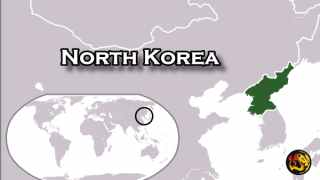
By Stefan J. Bos, Chief International Correspondent Worthy News
SEOUL/PYONGYANG (Worthy News) – Autocratically-ruled, nuclear-armed North Korea blew up sections of inter-Korean roads and rail lines on its side of the heavily fortified border between the two Koreas on Tuesday, triggering South Korea’s military to fire warning shots, several sources confirmed.
The rapidly escalating events added to concerns about growing hostilities in Asia.
Pyongyang said last week it would cut off the inter-Korean roads and railways entirely and further fortify the areas on its side of the frontier to push for a “two-state” system, scrapping its longstanding goal of unification.
That became clear Tuesday as video shared by South Korea’s military showed a cloud of white and gray smoke emerging from an explosion at a road near the border town of Kaesong.
North Korean trucks and excavators could be seen clearing out debris. Another video revealed smoke emerging from a coastal road near the eastern border.
In response to the blasts, the South Korean military fired warning shots.
Destroying the roads is in line with North Korean leader Kim Jong Un’s attempt to cut off ties with South Korea and formally cement it as the North’s principal enemy, analysts said.
IRON GRIP
Kim has maintained an iron grip on his nation, executing or imprisoning perceived opponents, including tens of thousands of Christians who are believed to be in labor camps.
Long lingering tensions between the two Koreas mounted last week after the North accused Seoul of sending drones over Pyongyang.
North Korea said the flying objects scattered a “huge number” of “anti-North leaflets,” and Kim Yo Jong, leader Kim Jong Un’s powerful sister, warned Tuesday that Seoul would “pay a dear price.”
South Korea’s government refused to say whether the South Korean military or civilians had flown the alleged drones.
The two Koreas have also clashed over balloons of trash floated since May from North Korea.
Pyongyang has said the launches are a response to balloons sent by anti-regime activists in the South.
North Korea has been technically at war with the South after their 1950-53 war ended in an armistice, not a peace treaty.
CROSS-BORDER ROADS
Observers said the cross-border roads and railways are remnants of a rapprochement that included a 2018 summit.
Unification ministry data showed that Seoul reportedly spent over $132 million rebuilding the links through cheap loans to Pyongyang.
During a previous era of inter-Korean cooperation in the 2000s, the two Koreas reconnected two road routes and two rail tracks across their heavily fortified border.
But their operations were suspended as the Koreas wrangled over North Korea’s rapidly expanding nuclear weapons program and other issues.
Tuesday’s destruction of critical links with South Korea highlighted those differences at a time when North Korea seeks closer economic and military ties with Russia and China, further infuriating the West.
Ahead of Tuesday’s explosions, North Korean leader Kim convened a top national security meeting Monday, state media reported, formulating a plan of “immediate military action” amid spiking tensions with the South.
The meeting in Pyongyang, the capital, was reportedly attended by the country’s top security officials, including the army chief, other military officials, and the ministers of state security and defense.
“He set forth the direction of immediate military action and indicated important tasks to be fulfilled in the operation of the war deterrent and the exercise of the right to self-defense,” the Korean Central News Agency (KCNA) added.
Copyright 1999-2026 Worthy News. This article was originally published on Worthy News and was reproduced with permission.
Latest News from Worthy News
Israeli President Isaac Herzog has met victims’ families and survivors of Australia’s worst-ever terrorist and antisemitic attack that killed more than a dozen people, amid mounting tensions between the two nations.
Efforts to dismantle Hamas’ military infrastructure in Gaza are moving forward according to plan, despite tensions surrounding the ceasefire, a senior official involved in U.S. President Donald Trump’s Board of Peace initiative told Ynet in an exclusive report Wednesday.
As diplomatic talks continue between Washington and Tehran, new reports from inside Iran describe intensifying repression and widespread fear among ordinary citizens.
U.S. President Donald Trump met privately with Israeli Prime Minister Benjamin Netanyahu at the White House for nearly three hours Wednesday, with both leaders confirming that negotiations with Iran remain ongoing but no final agreement has been reached.
The Pentagon has instructed a second aircraft carrier strike group to prepare for potential deployment to the Middle East as the United States increases military readiness in response to rising tensions with Iran, according to The Wall Street Journal.
Authorities in the U.S. state of Arizona detained a suspect Tuesday in connection with the reported abduction of Nancy Guthrie, the 84-year-old mother of American television host Savannah Guthrie, as the high-profile investigation entered its ninth day.
Nine people were killed Tuesday in a mass shooting in the western Canadian province of British Columbia, and at least 27 others were injured, authorities confirmed late Tuesday, marking one of the deadliest attacks in Canada in recent years.







